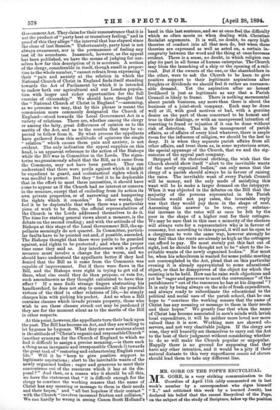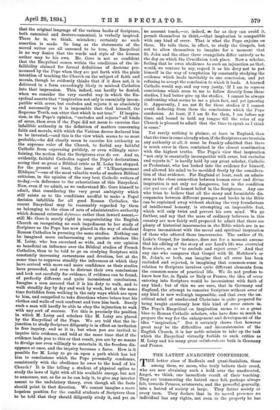MR. GORE ON THE POPE'S ENCYCLICAL.
MR. GORE, in a very striking communication to the Guardian of April 11th (ably commented on in last week's number by a correspondent who signs himself " X.," and criticised this week by a learned Jesuit), has declared his belief that the recent Encyclical of the Pope, on the subject of the study of Scripture, takes up the position that the original language of the various books of Scripture, both canonical and deutero-canonical, is verbally inspired. There he is, we think, mistaken; certainly no such assertion is made. So long as the statements of the sacred writer are all assumed to be true, the Encyclical in no way denies that the words and style of the human author may be his own. Mr. Gore is not so confident that the Encyclical comes within the conditions of the in- fallibility claimed for formal definitions of doctrine pro- nounced by the Pope when they are put forth with the plain intention of teaching the Church on the subject of faith and morals, though he evidently thinks that if it does not, it is delivered in a form exceedingly likely to mislead Catholics into that impression. This, indeed, can hardly be denied, when we consider the very careful way in which the En- cyclical asserts that " inspiration not only is essentially incom- patible with error, but excludes and rejects it as absolutely and necessarily as it is impossible that God himself, the Supreme Truth, can utter that which is not true." If inspira- tion, in the Pope's opinion, " excludes and rejects " all kinds of error, then even if the Pope did not mean to exercise that infallible authority in the definition of matters concerning faith and morals, with which the Vatican decree declared him to be invested,—and this is the view which seems to us most probable,—he did clearly mean to exercise his authority as the supreme ruler of the Church, to forbid any faithful Catholic from expressing publicly, or even willingly enter- taining, the notion that the Scriptures ever do err. And so, evidently, faithful Catholics regard the Pope's declarations, seeing that so great a Biblical critic as M. Loisy has stopped, for the present at least, the issue of " L'Enseignement Biblique,"—one of the most valuable works of modern Biblical criticism, in the opinion of the very best Catholic writers of to-day,—in deference to the exhortations of this Encyclical. Now, even if we admit, as we understand Mr. Gore himself to admit, that considering the very great ambiguity which still exists as to the conditions needful to make a Papal decision infallible for all good Roman Catholics, the recent Encyclical may be reasonably regarded by them as belonging to the class of acts of administrative authority which demand external deference rather than inward assent,— still Mr. Gore is surely right in congratulating the English Church on recognising no such impediment to her study of Scripture as the Pope has now placed in the way of obedient Roman Catholics in pursuing the same studies. Nothing can be imagined more embarrassing to genuine scholars like M. Loisy, who has exercised so wide, and in our opinion so beneficial an influence over the Biblical studies of French Catholics, than to be told to go on studying Scripture with constantly increasing earnestness and devotion, but at the same time to suppress steadily the inferences at which they have arrived with more and more confidence as their studies have proceeded, and even to distrust their own conclusions and look out carefully for evidence, if evidence can be found, of perfectly different and quite inconsistent conclusions. Imagine a man assured that it is his duty to walk, and to walk steadily day by day and week by week, but at the same time forbidden from walking in the only ways which are open to him, and compelled to take directions where briars tear his clothes and walls of rock confront and turn him back. Surely such a man will hardly be able to obey the injunction to walk with any sort of success. Yet this is precisely the position in which M. Loisy and scholars like M. Loisy are placed by the Encyclical of the Pope. We are told that the in- junction to study Scripture diligently is in effect an invitation to free inquiry, and so it is; but when you are invited to inquire into evidence, and told at the same time that if the evidence leads you to this or that result, you are by no means to divulge nor even willingly to entertain it, the freedom dis- appears at once, and the inquiry becomes a farce. How is it possible for M. Loisy to go on upon a path which has led him to conclusions which the Pope personally condemns, consistently with the obedience he owes to the head of his Church ? It is like telling a student of physical optics to study the laws of light with all his available energy, but not to announce, nor, as far as he can help it, to give any interior assent to the undulatory theory, even though all the facts should point in that direction. We cannot imagine a more hopeless position for the candid students of Scripture than to be told that they should diligently study it, and yet on
no account teach,—or, indeed, so far as they can avoid it, permit themselves to think,—that inspiration is compatible with any kind of error. That is what the Pope enjoins on them. He tells them, in effect, to study the Gospels, but not to allow themselves to imagine for a moment that St. John and the other three evangelists differ entirely as to the day on which the Crucifixion took place. Now a scholar, feeling that he owes obedience to such an injunction as that, would, we venture to say, regard it as his duty not to put himself in the way of temptation by constantly studying the evidence which leads inevitably to one conclusion, and yet refusing to accept the conclusion to which it leads. A learned Catholic would say, and say very justly, ' If I am to repress convictions which seem to me to follow directly from these studies, I had better give up the studies. I cannot be always confronting what seems to me a plain fact, and yet ignoring it. Apparently, I am not fit for these studies if I cannot avoid deducing from them the conclusions which the Pope condemns. At least, if I am fit for them, I am before my time, and bound to hold my tongue till the ruler of my Church is pleased to admit that the time to speak as I think is come.'
Yet surely nothing is plainer, at least in England, than that the time is come already when, if the Scriptures are to retain any authority at all, it must be frankly admitted that there is much error in them contained in the closest combination with the highest truths. The Pope's view that inspiration
"not only is essentially incompatible with error, but excludes and rejects it," is hardly held by any great scholar, Catholic or Protestant, who has looked into the evidence for himself, and allowed his mind to be moulded freely by the considera- tion of that evidence. For England at least, such an admis- sion as the close connection between human error and divine inspiration is not only not dangerous, but is the condition sine qud non of all honest belief in the Scriptures. Any one who tries to believe that all the many and formidable dis- crepancies between different passages and books in the Bible can be explained away without shaking the very foundations
of intellectual honesty, is attempting an impossible feat, which will only twist and pervert his own mind. We go further, and say that the mass of ordinary believers in this country are now fairly well prepared to admit that there are plenty of historical inaccuracies in the Bible which are in no
degree inconsistent with the moral and spiritual inspiration of those who uttered these inaccuracies. The author of St. Luke's Gospel, for instance, does not for a moment assume that his editing of the story of our Lord's life was overruled from above, so as " to exclude and reject error." And that any one who compares that Gospel with St. Matthew's or St. John's, or both, can imagine that all error has been excluded and rejected, is imagining that common-sense in relation to Scripture involves quite different elements from the common-sense of practical life. We do not profess to know how far, in Spain or Italy or France, the idea of error entering into Scripture would be inconsistent with faith of any kind; but of this we are sure, that in Germany and England, the attempt to conceive Scripture without error of any kind is now well-nigh impossible, and that even the un- critical mind of uneducated Christians is quite prepared for being taught cautiously how this kind of error enters in. The Pope's Encyclical on Inspiration seems to us a great blow to Roman Catholic scholars, who have done so much to prepare the way for the enlargement and development of the idea "inspiration." But it certainly shows that however great may be the difficulties and inconsistencies of the English Church, it is her noble mission to take up the task which the Encyclical virtually forbids to such critics as M. Loisy and his many great collaborateztrs both in Germany and France.



















































 Previous page
Previous page